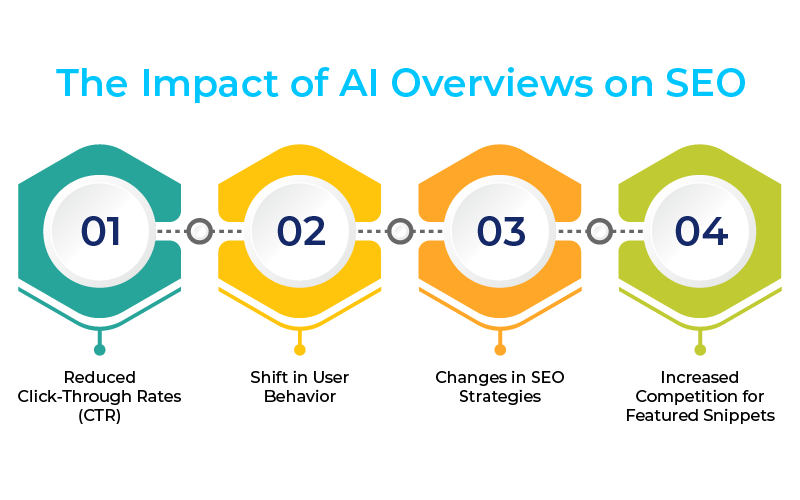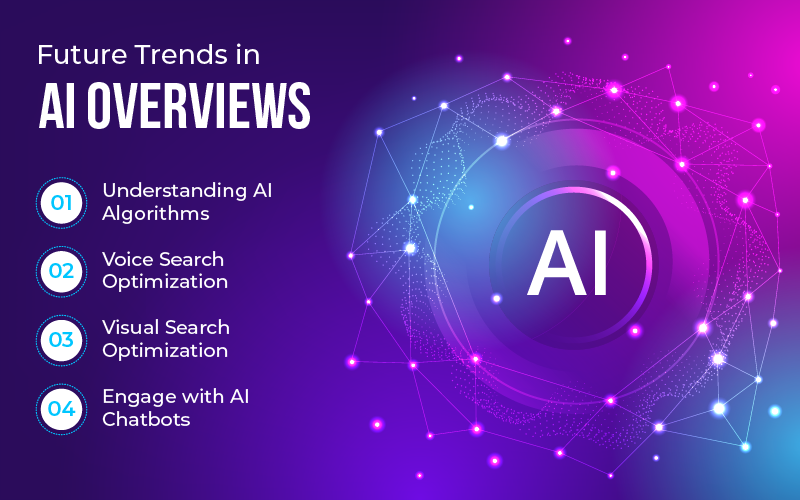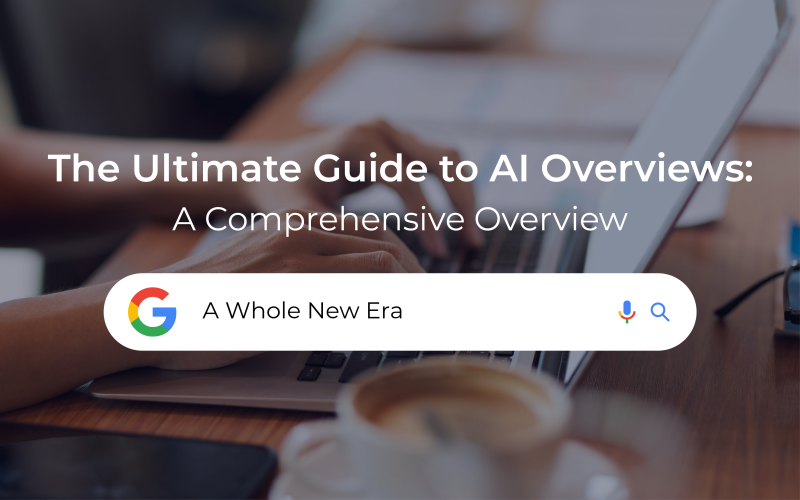Google’s AI Overviews leverage generative AI to offer concise and informative summaries directly within search results.
If you’re a digital marketing enthusiast or simply fascinated by how Google operates, you’re probably familiar with its constant efforts to improve the user search experience. This time, it’s all about AI Overviews.
With 5.9 million searches happening every minute, Google knows the importance of making sure users get results they can trust. To keep delivering on that promise, Google has introduced a new feature called ‘AI Overview,’ which streamlines the search process by placing high-quality, relevant results at the top.
Curious about what is AI Overview? Let’s break it down and explore it step by step.
Google’s AI search revolutionizes the way we find information online. Gone are the days of endless scrolling through countless websites. Now, with the power of AI, Google can quickly analyze and understand your query, delivering the most pertinent information right at the top of the search results page.

No more sifting through irrelevant pages. Google’s AI intelligently identifies the key points from various sources and presents them in a concise, easy-to-understand format. This means you can quickly grasp the core information without having to click through multiple links.
But that’s not all. To ensure transparency and credibility, Google provides links to the original sources, allowing you to delve deeper into the topic if you wish. This feature not only saves you valuable time but also empowers you to make informed decisions based on reliable information.
How Do AI Overviews Work?
AI Overviews are like having a super-smart assistant who can quickly scan the web, understand complex topics, and then explain them in a way that’s easy to grasp. Imagine asking your assistant, “What’s the deal with quantum computing?” and getting a clear, concise summary in seconds. That’s essentially what AI Overviews do.

They use advanced AI models to process vast amounts of information from the web, identify key points and relationships between concepts, and then generate concise summaries that highlight the most important information. These summaries are presented in a clear and easy-to-understand format, often with links to the original sources for further exploration. While AI Overviews can be a helpful tool, it’s essential to verify information from multiple sources for accuracy.
Here’s a simplified overview of the process Google’s AI follows when generating search result summaries, or “overviews.”
- Query Processing
The first step is to analyze the user’s search query. Similar to AI tools like ChatGPT and Copy.ai, Google’s AI, such as Gemini, begins by interpreting the words and understanding the user’s intent. It then generates a response based on its training model.
2. Document Selection
Next, the AI identifies and retrieves relevant web pages or documents to support and validate the response. This ensures that the overview is based on credible and accurate information.
3. Fact-checking
The generated response is cross-referenced with the selected documents for accuracy. If any discrepancies or contradictions are found, adjustments are made to ensure the final answer is reliable.
4. Evaluation
Finally, the response is evaluated for clarity, relevance, and overall quality before being displayed to the user. Continuous user feedback is also used to improve the accuracy and effectiveness of future responses.
The Impact of AI Overviews on SEO

- Reduced Click-Through Rates (CTR)
AI-generated overviews have reduced the average CTR for organic search results, with a 37% drop over the past two years as more users get answers directly from search results.
- Shift in User Behavior
65% of users stay on the search results page when AI overviews provide the information they need, leading to fewer site visits and shorter user sessions.
- Changes in SEO Strategies
SEO practices are adapting, with 72% of professionals focusing on optimizing content for AI-generated summaries and featured snippets.
- Increased Competition for Featured Snippets
Securing featured snippets is crucial, as these pages have an 8.6% higher CTR. Businesses are competing for these spots to maintain visibility.
Related Post: Top AI Tools For Digital Marketing in 2024
Strategies to Respond to AI Overviews in 2024
- Optimize for Featured Snippets
Structure content with clear answers, headers, and relevant keywords to capture featured snippets, as 12.3% of search queries now include them.
- Focus on Long-Tail Keywords
Long-tail keywords have a higher conversion rate and can attract users seeking more detailed information beyond AI summaries.
- Enhance Content Quality
While AI provides quick answers, users still value in-depth content. High-quality content helps establish authority and drive traffic.
- Improve User Engagement
Use videos, infographics, and interactive elements to engage users and offer additional value beyond AI overviews.
- Utilize Structured Data
Implement structured data to improve search visibility and increase the chances of being featured in AI overviews.
- Monitor and Adapt
Stay updated on AI trends and SEO changes to adapt strategies and maintain organic traffic.
By optimizing for AI overviews, improving content quality, and diversifying traffic, businesses can navigate the evolving SEO landscape and thrive in 2024.
Importance of Google’s AI-Powered Overview
- Improving User Experience
- Boosting Search Relevance
Future Trends in AI Overviews

Artificial Intelligence (AI) is rapidly transforming the digital landscape, and search engine optimization (SEO) is no exception. As AI continues to evolve, we can expect a future where search engines become even more intelligent, intuitive, and personalized.
As AI reaches new heights, it will fundamentally change how writers, marketers, and SEO specialists approach content creation and optimization. Staying informed and adapting to these changes will be crucial for anyone in the digital space.
- Understanding AI Algorithms
Keeping up with AI and machine learning algorithm updates is key. Follow industry blogs, news, and newsletters to stay informed about the latest changes. As AI evolves, ensure your SEO strategies are aligned with these updates for optimal results.
- Voice Search Optimization
Voice search has become an integral part of daily life. Optimize your content to answer common questions in a conversational tone, as AI-driven voice assistants prioritize natural language responses. This will improve your chances of ranking higher in voice searches.
- Visual Search Optimization
With AI-powered visual search on the rise, it’s essential to optimize images and videos using descriptive alt text and relevant keywords. This not only improves SEO but also increases the likelihood of your content being included in AI Overviews.
- Engage with AI Chatbots
Integrating AI chatbots on your website enhances customer engagement by providing real-time assistance. These chatbots gather valuable data on user behavior and preferences, which can help refine your SEO strategies and improve content personalization.
Disadvantages of AI Overviews
While AI Overviews have been widely praised, they’ve also faced significant criticism. Industry experts have explored AI overviews deeply and uncovered several issues.
- Bias and Inaccuracy
AI models, like Google’s, are based on training data. When faced with unfamiliar queries outside of their training, AI can produce biased or inaccurate results, especially in sensitive areas like hiring or lending.
- Dependency on External Sources
The accuracy of AI overviews depends on the quality of external sources. If the information is outdated or incorrect, the AI’s response will reflect these flaws. With so many diverse sources available online, AI may sometimes deliver incorrect or unreliable answers.
- Reduced Organic Traffic (Zero Click Searches)
AI-generated summaries have led to a 60% reduction in click-through rates (CTR). Since users can now get answers directly from search results, fewer people click through to websites, resulting in decreased organic traffic. This poses a challenge for content creators whose work may be bypassed.
- Limited Contextual Understanding
AI can struggle with understanding complex or nuanced queries. This can result in oversimplified or misinterpreted information in AI overviews. Additionally, AI may lose context in long conversations or diverse topics, leading to irrelevant or incomplete responses.
These disadvantages highlight the ongoing challenges in the use of AI overviews and the need for improvement in its algorithms and data sourcing.
“Success in creating AI would be the biggest event in human history. Unfortunately, it might also be the last, unless we learn how to avoid the risks.”
– Stephen Hawking
Conclusion
AI Overviews have undeniably transformed the way users interact with search engines, providing faster and more concise answers. However, as with any innovation, there are challenges to overcome. Issues like bias, reliance on external sources, reduced organic traffic, and limited contextual understanding highlight the need for continuous improvement in AI technology.
For businesses, it’s crucial to stay adaptive by optimizing content for AI-driven search results, focusing on long-tail keywords, and ensuring high-quality, in-depth information to remain relevant in an ever-evolving digital landscape. While AI overviews present challenges, they also offer new opportunities to enhance SEO strategies and engage users in more meaningful ways. The future of AI in search will continue to evolve, and those who embrace these changes will be better positioned for success.
Still unsure where to begin?
Kickstart your SEO journey by analyzing your website with a thorough audit. Book your discovery call with Scrum Digital today!
FAQ’s
How do AI overviews impact SEO?
AI overviews impact SEO by prioritizing concise, relevant answers at the top of search results, which can reduce click-through rates for organic search. To adapt, businesses must optimize content for featured snippets, focus on long-tail keywords, and create high-quality, in-depth content that appeals to both AI algorithms and users.
What is an AI overview on Google?
An AI overview on Google is a feature that provides users with a concise summary of relevant information at the top of search results, generated by artificial intelligence. It gathers key insights from multiple sources to offer quick, accurate answers without the need to click through to individual websites.



1 comment
Very good insights in the blog